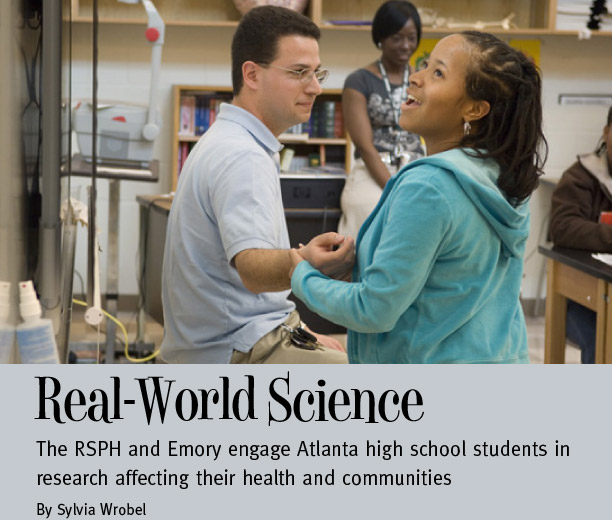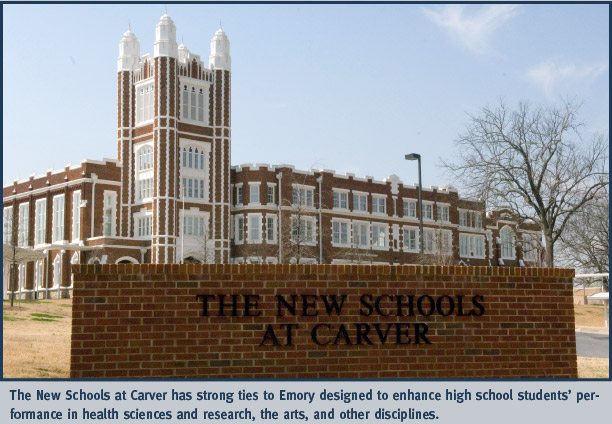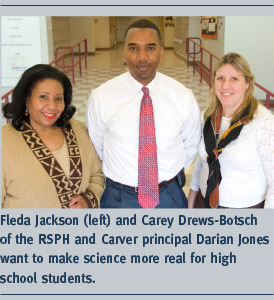














|
 |
| |
|
|
| |
|
|
| |
|
|
 |
Faculty
and students in the Rollins School of Public Health (RSPH) are about
to gain 200 new research partners. Their soon-to-be investigators
often have first- or second-hand knowledge of possible research
topics, including risk factors such as diet and obesity and risky
behaviors such as substance abuse, violence, and sex. In fact, these
new partners will be the major drivers in choosing what issues to
study. Being 9th and 10th graders, they first need some training
in research methodology and ethics. |
 |
| |
|
|
 |
Emory
faculty, including those from the RSPH, will provide that training
in collaboration with the students’ teachers. All want to
transform the students’ perception of science from a mysterious
“black box” into a powerful and accessible process that
can address issues affecting students and their communities. They
also want to model to these students about what it means to be a
scientist and encourage them to consider science as a career.
The program is part of a $900,000
grant to Emory from the Arthur M. Blank Family Foundation’s
Pathways to Success. Spread over 2 1/2 years, the grant will help
raise student achievement at the New Schools at Carver. The “old”
George Washington Carver High School was one of Atlanta’s
lowest performing secondary schools. The “New” Schools
at Carver is designed to change that with small, personalized environments;
rigorous college-prep curricula; and strong community partnerships
that include Emory and other Atlanta-area universities.
The Blank Foundation grant to Emory
calls for mentoring, tutoring, and postsecondary preparation for
students and professional developmental support for teachers in
various disciplines at Carver. It also includes the creation of
specialized career readiness opportunities in Health Sciences and
Research (HSR), one of the five schools at Carver.
Interdisciplinary by design, the Carver
initiative is led by Pat Marsteller, director of the Emory College
Center for Science Education and the Howard Hughes Undergraduate
Science Initiative. Serving with her are faculty and graduate students
in the College, the Graduate School of Arts and Sciences, the Nell
Hodgson Woodruff School of Nursing, and the RSPH. Carey Drews-Botsch
and Fleda Jackson of the RSPH, Madge Donnellan of the School of
Nursing, and Michelle Lampl of the Department of Anthropology are
collaborating with HSR faculty and students at Carver.
“Whatever our research specialization,
we are joined by our commitment to engaging the broadest community
possible in how good science works,” says Marsteller. |
 |
| |
|
|

|
| |
|
|
 |
Learning
about science
Although much of the research to be done by Carver students is yet
to be determined, the groundwork is now being laid. Twelve 9th and
10th graders recently began orientation at Emory, with a longer
summer enrichment program scheduled for May. Many of their teachers
are involved in Emory-led courses in problem-based learning and
are working with Emory faculty and graduate students to develop
science curricula and study materials for their students. Lampl
is designing a practicum experience for Emory graduate students
and a new course in science in action for undergraduates. Additionally, Lampl, Drews-Botsch, Jackson,
and Donnellan will work with Emory students and HSR teachers to
integrate individual and community health into the science and math
curriculum at Carver.
action for undergraduates. Additionally, Lampl, Drews-Botsch, Jackson,
and Donnellan will work with Emory students and HSR teachers to
integrate individual and community health into the science and math
curriculum at Carver.
Their goal is to teach Carver students
how to apply thinking skills to science instead of learning seemingly
unrelated facts. This spring, approximately 200 HSR students participated
in a health risk appraisal, administered by Donnellan and using
questions from the CDC’s Youth Risk Behavior Survey. Each
student received a report on his or her own risk profile and compared
it to national data from the CDC and to aggregated data for HSR
students. The data, minus the students’ names, will be used
to design the science curriculum around problem-based learning.
“This kind of problem-based
learning, built on their own data, should make information very
real to the students,” says Donnellan. “For example,
information gathered from the group about eating behavior, exercise,
and weight may give new significance to the study of metabolism
in biology class. If members of the class already have risk factors
for high blood pressure, knowing that will add new punch to the
study of factors influencing blood pressure.” |
 |
| |
|
|
 |
Sound
research, sound ethics
Carver students will use what they learn to help design community-based
research. This type of research is a negotiated process between
investigator and community in terms of what is studied and how it
is examined, notes Jackson, who studies how stresses related to
race and gender affect health, especially among African American
girls and women. The Carver initiative is “a wonderful opportunity
for students to become involved in determining the questions they
want to ask—questions imbedded in their lives and the lives
of their families—and then learning the tools they will need
to ask those questions in a scientific way,” she says. “These
questions will allow us to acquaint students with issues around
health equity as well as health disparity, a concept that helps
us move from a deficit approach to a more activist approach.”
The health risk appraisal will serve
as a solid springboard for explaining how epidemiology is used to
determine health risk. Its 60-plus questions are often highly personal,
not only asking about the individual student’s diet and weight,
but also about drug use, weapon use, experience with violence, sexual
behavior, and mental health. Given its content, the health risk
appraisal makes an equally strong springboard for discussing the
importance of research ethics and the protection of human subjects.
Public health and nursing faculty and students will provide training
in research ethics principles and methodology. Carver teachers and
students will undergo the same research ethics and methodology certification
process as Emory faculty and students.
After completing their training, Carver
students and teachers will partner with Emory faculty to design
their own research program to study health and health disparities
in their communities. As the program matures over the next four
years, and as Carver adds 11th- and 12th-graders, the program will
integrate research into classes for 1,100 students.
With time, says Marsteller, the New
Schools at Carver will have more teachers with more experience in
research and strategies, such as inquiry- and problem-based learning,
which have proven to be effective in increasing student performance.
Students should have better skills in math and science, making them
more eligible for HOPE scholarships and college admission. With
more students engaged, fewer will drop out of high school. Some
will follow their Emory faculty and student mentors into science
careers.
Drews-Botsch, director of the epidemiology
doctoral program at the RSPH, has an additional goal. The Young
Epidemiology Scholars Program offers college scholarships to U.S.
students who conduct epidemiology research. She will pair doctoral
students with up to four Carver students to develop projects with
the goal of winning a scholarship.
In her view, the New Schools at Carver
initiative is a win-win for everyone. “Working with Carver,”
she says, “will give us all a different perspective on the
power of science to create change.”
Sylvia Wrobel
is former associate vice president for health sciences communications
at Emory. |
 |
| |
|
|
| |
|
|
|
|
|
|

